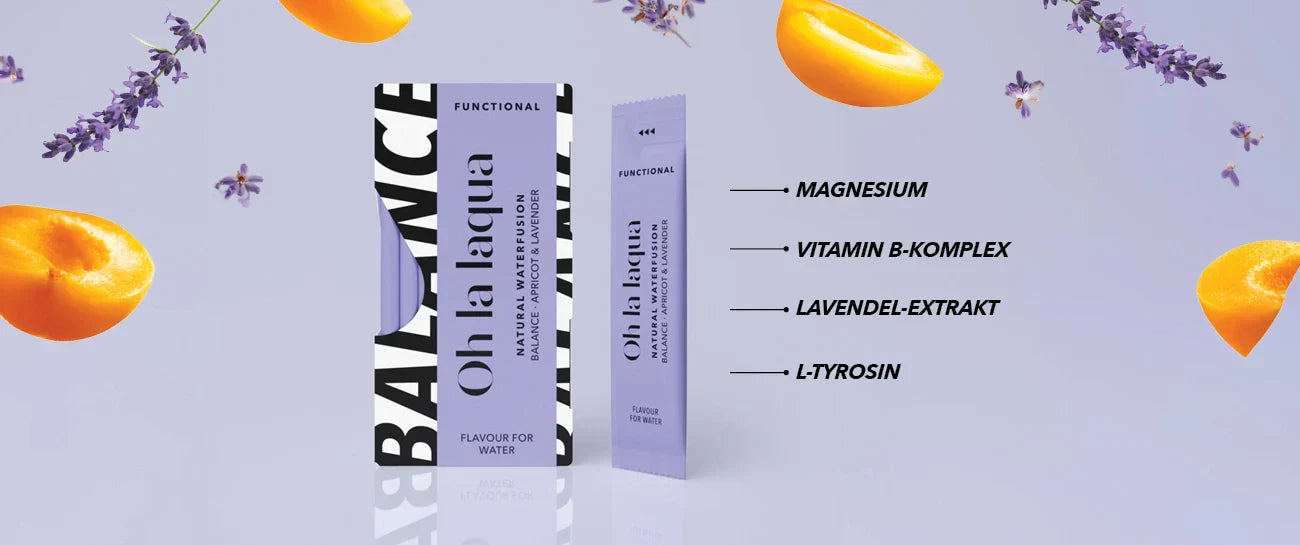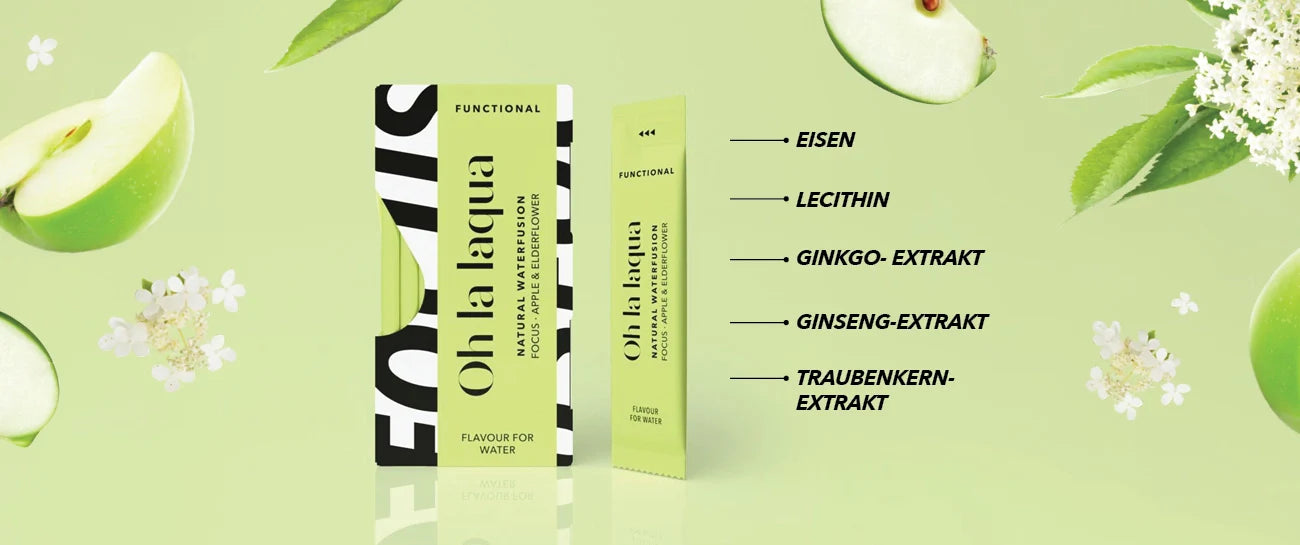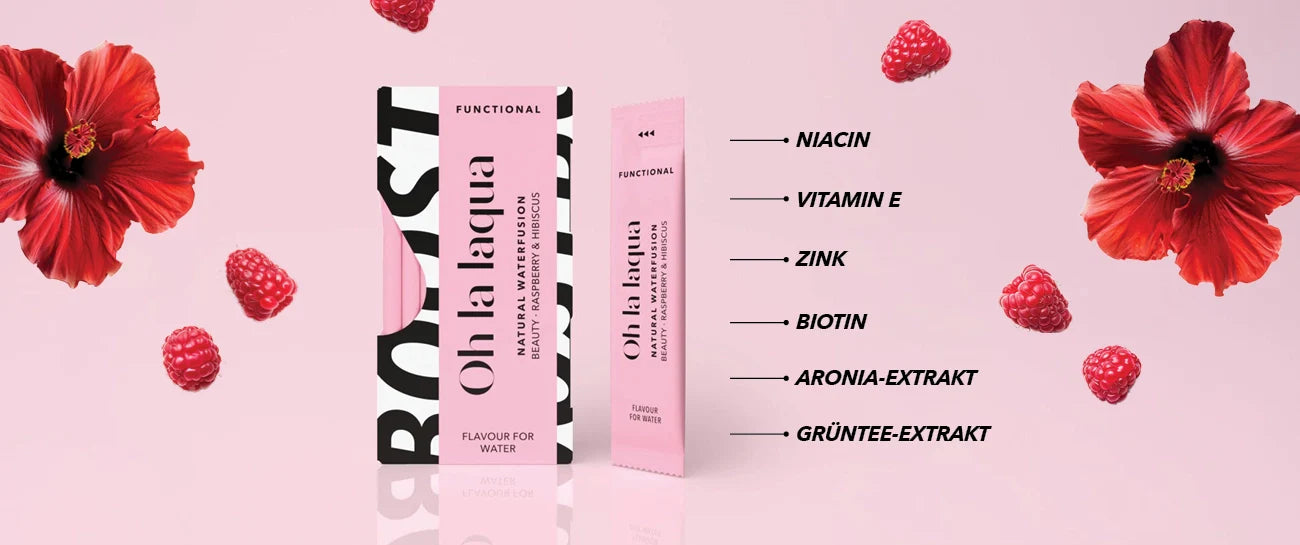Concentration, attention and focus are more important today than ever before. Whether at work, when learning, in sport or in our leisure time - the ability to focus is crucial in order to complete tasks efficiently and successfully. However, we often fail to muster the necessary concentration. Constant distractions, stress and fatigue can prevent us from maintaining our focus.
In this blog article, we look at why concentration is sometimes difficult and how we can strengthen it with targeted exercises and small adjustments in everyday life. We also explain what exactly functional water is and how the micronutrients lecithin, iron, ginseng extract, ginkgo extract and grape extract contribute to maintaining normal cognitive function.
Concentration, attention and focus: How can functional water contribute to normal cognitive function?
Topic overview:
- In which situations is undivided attention particularly important?
- Why do you sometimes find it difficult to concentrate?
- Strategies to improve concentration
- Exercises to improve concentration
- Concentration and water intake: drinking, an underestimated factor
- How can functional water help increase concentration and attention?
- What is functional water?
- Micronutrients to support the ability to concentrate
- Conclusion
In which situations is undivided attention particularly important?
Concentration is the key to success in many areas of life. It enables you to focus fully on a task and make the most of your own abilities. Concentration is particularly important in a professional context: whether working on complex tasks, analyzing data or in creative processes - without full concentration, it is difficult to achieve precise and high-quality results. Those who are less easily distracted usually work more efficiently and with greater focus.
Concentration is also essential when learning or in exam situations. Pupils and students have to deal intensively with new knowledge, process information and internalize it for the long term. Only those who stay focused can learn effectively and be well prepared for exams. The ability to stay focused also plays a central role in sport. Whether in training, competitions or precision sports - even the slightest distraction can impair performance. Creative activities such as painting, writing or making music also benefit enormously from a calm and focused mind.
Concentration is therefore a fundamental skill that supports us in many areas - be it at work, when learning, in sport or with creative projects. It helps us to realize our potential and achieve our goals with focus and clarity. Despite this necessity, many people find it difficult to concentrate on one thing for any length of time. Why is that?
Why do you sometimes find it difficult to concentrate?
There are various factors that can make concentration difficult - here are a few examples.
-
Overload and stress:
An overloaded schedule or large amounts of work often lead to inner restlessness, which makes it difficult to focus on the essentials. -
Distractions:
Smartphone notifications, noisy environments and constant switching between tasks (multitasking) are extreme concentration killers. -
Lack of structure:
Without clear goals and structured workflows, there is often a lack of focus as the mind wanders aimlessly. -
Poor sleep:
Tiredness reduces mental performance and makes it difficult to stay focused. -
Nutritional and fluid deficiencies:
A balanced blood sugar level and a good supply of nutrients and water are essential for good concentration.
You will certainly recognize yourself in some of these examples. And you're probably wondering how you can improve your ability to concentrate, so you'll find some helpful tips in the following paragraph.
Strategies to improve your concentration
There are various techniques you can use to increase and maintain your concentration. Here are some tips and tricks:
-
Minimize distractions:
Reduce sources of distraction, for example by switching off notifications on your smartphone or setting up a quiet workspace. -
Plan breaks:
Take breaks consciously - the Pomodoro technique (25 minutes work, 5 minutes break) can help to strengthen your focus. -
Set small, achievable goals:
Instead of tackling a large task in one go, breaking it down into small, clear steps can help you stay focused. -
Exercise and fresh air:
Small exercise sessions or a short walk promote blood circulation and can release "mental blockages". -
Mindfulness exercises:
Meditation or mindfulness exercises such as breathing techniques help to calm thoughts and experience the moment more consciously.
Exercises to improve concentration
Certain exercises can be easily integrated into everyday life to strengthen the ability to concentrate:
-
Breathing exercise "4-7-8 method":
Breathe in for four seconds, hold your breath for seven seconds and breathe out for eight seconds. This calms and focuses the mind. -
Breathing exercise "4-4-4-4":
The "Box Breathing" breathing technique is a little easier for beginners, simply inhale for 4 seconds, hold your breath for 4 seconds, exhale for 4 seconds, hold your breath for 4 seconds and so on. -
"5-minute meditation":
Sit in a quiet place, close your eyes and concentrate on your breathing. Now simply let your thoughts pass by without following them and holding on to individual topics. -
Memory training:
Do short memory exercises, e.g. memorizing a shopping list or a telephone number. This promotes the ability to focus and strengthens your short-term memory. -
Mindfulness during routine tasks:
During simple tasks, such as brushing your teeth or washing the dishes, consciously concentrate on the action and practise focusing your mind on the moment and not following thoughts that arise.
Concentration and water intake: drinking, an underestimated factor
The human body consists of around 60% water. Water is crucial for many bodily functions and also plays a major role in mental performance. Even slight dehydration can lead to tiredness, poor concentration and a loss of alertness.
By the way: The first sign of dehydration is thirst. As soon as you feel thirsty, your body is already 1% dehydrated. Unbelievable, isn't it? In another of our blog articles, you can find out how to recognize dehydration and what consequences it has for your body.
Our tip: Drinking regularly - preferably healthy water or unsweetened tea - is a simple but effective way to maintain your normal cognitive function. You also prevent tiredness and headaches and improve your mood and stress regulation. You also ensure that your brain is optimally supplied with oxygen and energy, which in turn promotes your undivided attention.
Concentration, attention and focus: how functional water can help you.
To maintain your normal cognitive function, we have developed the functional water OH LA LAQUA Focus with important micronutrients. This makes OH LA LAQUA Focus a typical functional water.
What exactly is functional water?
Functional water not only quenches thirst, it also fulfills certain functions, as the name suggests: It supplies your body with important vitamins and micronutrients.
The aim of functional water is to achieve certain health-promoting effects through special ingredients. Micronutrients and vitamins can, for example, contribute to the normal functioning of your immune system, to maintaining a normal complexion, to a normal energy metabolism or to relaxation.
Functional water therefore usually contains vitamins, minerals, herbal extracts, antioxidants, amino acids or electrolytes to help your body maintain certain functions.
Micronutrients to support the ability to concentrate
In addition to water intake, there are certain micronutrients that contribute to normal cognitive function - all of which can be found in our Functional Water OH LA LAQUA Focus:
-
Lecithins:
Lecithins are components of cell membranes and play an important role in communication between nerve cells. They contain choline, which contributes to the formation of acetylcholine - a neurotransmitter that is relevant for memory and learning processes. -
Iron:
Iron is essential for the transportation of oxygen in the blood. An iron deficiency often leads to tiredness and concentration problems, as the brain is not supplied with enough oxygen. -
Ginseng extract:
Ginseng is traditionally used to improve mental performance. Studies show that ginseng promotes blood flow to the brain and has a stimulating effect, which leads to better alertness and reaction speed. -
Ginkgo extract:
Ginkgo biloba promotes blood circulation and improves the oxygen supply to the brain, which can have a positive effect on concentration and memory performance. -
Grape extract:
Grape extract contains polyphenols, especially resveratrol, which has antioxidant properties and protects the nervous system from oxidative stress. Studies suggest that grape extract can support cognitive performance.
Conclusion
Concentration and focus are crucial factors for success in many areas of life. By minimizing distractions, maintaining a structured daily routine and taking regular breaks, concentration can be noticeably increased. In addition, integrating exercises such as meditation and breathing techniques into everyday life can help to sustainably improve the ability to focus. The combination of water intake and the right micronutrients also supports the ability to concentrate in a natural way. With these small adjustments and a conscious lifestyle, almost anyone can regain control of their power of concentration step by step.
OH LA LAQUA Focus with apple-elderflower flavor is the perfect functional water to maintain your normal cognitive function. It contains the important micronutrients lecithin, iron, ginseng extract, ginkgo extract and grape extract and tastes really delicious. This will certainly make it easy for you to keep your focus - in every situation in your life.





